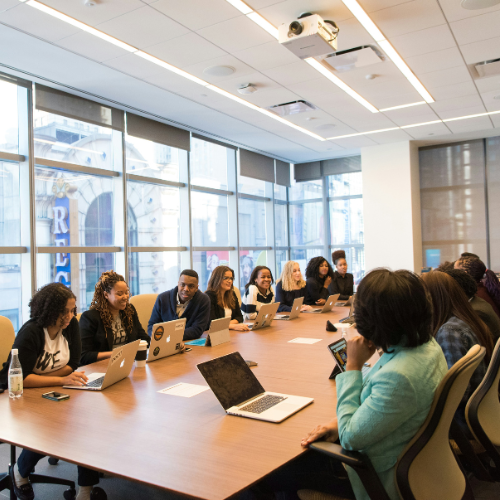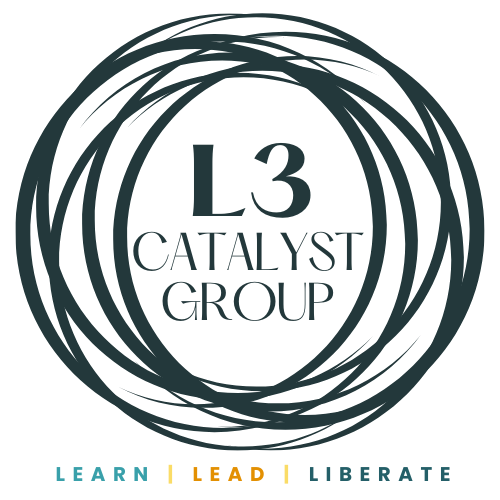Steps to Having Challenging Conversations
What is your relationship with holding challenging conversations?
Avoiding difficult conversations is human. Discomfort sucks, and there are a million reasons to avoid pain and the unknown.

Thoughts spin through our minds: Who knows how they’ll react? What if it makes it worse? There’s no way we will come to a resolution. Why are they acting so ridiculous? How can they not see the trouble they are causing?
Scenarios abound. Maybe some of these are familiar:
You notice patterns of voices left out or minimized in your team or organization.
A national speaker at a recent event shared racist mindsets.
Team members take credit for the work that others completed.
A CEO is more concerned about their image outside of the organization than aligning their values to their actions within the organization.
A team member isn’t pulling their weight, but no one is talking to them directly about it.
What scenarios of conflict avoidance do you see around you?
Do you find yourself avoiding that difficult conversation with a colleague, boss, or friend?
Going toward discomfort helps us grow, learn, and be better humans and leaders.
Avoidance and dishonesty are rotten fruit, especially when our mission, vision, or values state that we want to work for equity and inclusion. Just because we value equity and inclusion doesn’t mean we naturally know how to engage in challenging conversations.

Skills to hold difficult conversations thoughtfully and intentionally are critical.
How can we hold truth-telling conversations without being taught the skills required?
Relationships and trust are key. If that’s not there, results can be disastrous.
If you are avoiding a conversation that you know you want to have, consider these steps:
1. Start with your values.
What do you value about the person? What values do you want to be evident in this interaction? What does that look like or sound like?
Example: I value every team member's participation. I value the things we can learn when we are brave.
2. Clarify what you see as the challenge.
Example: I’m noticing that the men speak over the women in our team meetings. OR I'm noticing that when you thank team members publicly, you typically thank those with more powerful positions.
3. Name the future state that you seek.
What would you like to be different relationally and situationally after the conversation? What different outcome would you like to see?
Example: I’d love to be a part of a team where everyone’s voice, contribution, and perspective are equally valued.
4. Practice before holding the conversation.
This can be done in various ways:
- Write down your main points before the conversation.
- Run the plan by a colleague who can give you neutral and honest feedback.
Example: Writing down beforehand phrases that could help if I get stuck.
5. Hold curiosity about the other person’s perspective.
How do they see this dynamic? Are they aware or resistant?
Example: Is this a dynamic you are noticing? Can you share what is important to you regarding various perspectives on our team?
6. Identify the next steps together.
Offer a step or two rooted in shared values to help you and the other person take steps together.
Example: If this isn’t a dynamic you have previously been aware of, would you be willing to consider a couple of next steps with me so our team can grow and everyone can experience being included and respected for their work?
7. Reflect upon what you learned and what worked…or didn’t.
Offer yourself patience and a chance to learn. Big challenges take time to address. What did you learn from the conversation about yourself or about the other person? What do you need to do to care for yourself if they are unwilling to listen and be open to engaging with you?

If you’d like to learn more, here are a few of my favorite sources:
- Courageous Conversations by Glen Singleton
- Nonviolent Communication
- Crucial Conversations: 10-Minute Book Summary (YouTube)
- Restorative Practices by the Restorative Lab
As we practice learning and leadership toward liberation, please be patient and loving with yourself.
Let me know if you want to talk through a scenario.
Beloveds, I wish you courage, rest, and community along the way,

Ways to get involved:
- Read L3 Catalyst Group’s latest newsletter from February 2023: Embracing the Messy…with Dee
- Register today for one or all of our monthly Equity Leadership Conversations. Our free virtual events are designed to build community, share ideas, grapple together, and converse about leadership, learning, and liberation themes.
- March 2024: Brave vs Safe Spaces: What are they, and how can we build them intentionally? held March 13 at 9 PST / 12 EST
- April 2024: Difficult Conversations - Why are they so hard? What can we do about it? held April 17 at 10 PST / 1 EST
- Email Deanna to register for a free Racial Healing Allies® Bias Workshop: As part of a learning cohort that Deanna is participating in, they offer a free, 90-minute Racial Healing Allies® Bias Workshop from 9-10:30 EST on 1 March 2024. Space is limited. Learn more about Racial Healing Allies® with Tovi Scruggs-Hussein here.

February 19, 2024




Comments